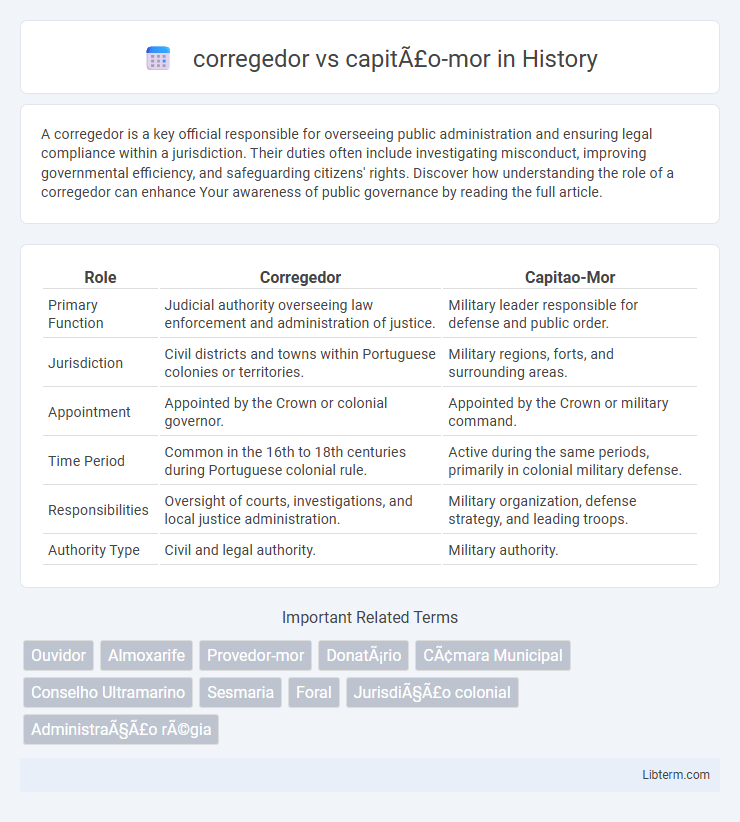A corregedor is a key official responsible for overseeing public administration and ensuring legal compliance within a jurisdiction. Their duties often include investigating misconduct, improving governmental efficiency, and safeguarding citizens' rights. Discover how understanding the role of a corregedor can enhance Your awareness of public governance by reading the full article.
Table of Comparison
| Role | Corregedor | Capitao-Mor |
|---|---|---|
| Primary Function | Judicial authority overseeing law enforcement and administration of justice. | Military leader responsible for defense and public order. |
| Jurisdiction | Civil districts and towns within Portuguese colonies or territories. | Military regions, forts, and surrounding areas. |
| Appointment | Appointed by the Crown or colonial governor. | Appointed by the Crown or military command. |
| Time Period | Common in the 16th to 18th centuries during Portuguese colonial rule. | Active during the same periods, primarily in colonial military defense. |
| Responsibilities | Oversight of courts, investigations, and local justice administration. | Military organization, defense strategy, and leading troops. |
| Authority Type | Civil and legal authority. | Military authority. |
Introdução ao Corregedor e Capitão-mor
The Corregedor and Capitao-mor were pivotal colonial administrative roles within the Portuguese Empire, each overseeing critical aspects of governance and military control. The Corregedor primarily exercised judicial and administrative authority, ensuring law enforcement and fiscal regulation in the territories. The Capitao-mor commanded military forces and was responsible for the defense and security of the colony, often coordinating with the Corregedor to maintain order and implement royal policies.
Origem Histórica dos Cargos
The Corregedor originated in the Portuguese judicial system as a royal magistrate responsible for overseeing local administration and law enforcement, ensuring compliance with royal decrees during the colonial period. The Capitao-Mor, emerging from military traditions, acted as the chief military and administrative officer in colonial territories, tasked with defense and order maintenance. Both roles reflected the Crown's strategy to consolidate authority, with the Corregedor emphasizing judicial oversight and the Capitao-Mor focusing on military command.
Funções e Atribuições do Corregedor
The Corregedor held judicial and administrative authority, responsible for overseeing law enforcement and ensuring proper functioning of local courts, while the Capitao-Mor was primarily tasked with military leadership and defense in the captaincy. The Corregedor investigated crimes, supervised tax collection, and enforced colonial regulations, maintaining legal order within the territory. This role was crucial in maintaining civil governance by managing disputes and implementing royal decrees independently of military operations commanded by the Capitao-Mor.
Papel e Responsabilidades do Capitão-mor
O Capitao-mor exercia funcoes militares e administrativas essenciais, sendo responsavel pela defesa territorial, comando das forcas armadas locais e manutencao da ordem publica. Atuava como autoridade maxima em questoes de seguranca, coordenando expedicoes militares e a vigilancia contra invasoes ou rebelioes. Seu papel incluia tambem a supervisao da milicia e a implementacao das politicas de seguranca do governo colonial.
Diferenças Hierárquicas e Administrativas
The Corregedor held a higher hierarchical position than the Capitao-Mor, overseeing judicial and administrative matters within a designated region, while the Capitao-Mor commanded military forces and maintained local order. Corregedores operated under the authority of the royal government with broad administrative jurisdiction, whereas Capitaes-Mores had limited administrative powers focused primarily on defense and public security. The hierarchical distinction was marked by the Corregedor's role in law enforcement and governance contrasted with the military and policing responsibilities of the Capitao-Mor.
Influência no Sistema Judiciário Colonial
The Corregedor held significant judicial authority in colonial administration, overseeing local courts and ensuring adherence to royal laws, which reinforced centralized judicial control. In contrast, the Capitao-Mor primarily managed military and territorial defense roles, with limited direct influence on the judiciary but maintaining order through enforcement. The interplay between the Corregedor's legal oversight and the Capitao-Mor's enforcement powers shaped the effectiveness and reach of colonial justice systems.
Impacto nas Estruturas Militares e de Segurança
The Corregedor's role in overseeing judicial and administrative matters imposed stricter discipline and accountability within military units, enhancing internal security structures in colonial territories. The Capitao-Mor, responsible for military command and defense coordination, directly influenced the operational efficiency and strategic deployment of regional armed forces. The interaction between these offices shaped the balance between civil oversight and military authority, impacting the organization and effectiveness of security institutions.
Relações com a População Local
The corregedor held judicial and administrative authority, directly influencing local governance and dispute resolution within communities, which fostered a structured legal relationship with the population. The capitao-mor commanded military forces responsible for territorial defense and maintaining public order, often interacting with locals through security measures and militia organization. Their roles complemented each other in shaping the dynamic between colonial authorities and indigenous or settler populations, balancing civil administration with military oversight.
Transformações e Extinção dos Cargos
The cargos of corregedor and capitao-mor experienced significant transformations during the colonial period, adapting to administrative and military reforms aimed at centralizing royal authority. The corregedor's role evolved from judicial oversight to broader administrative control, while the capitao-mor's military and territorial commands were progressively diminished. Both positions were ultimately extinguished in the 18th century as part of the Portuguese Crown's efforts to streamline governance through new institutional structures like the Intendencias.
Legado e Relevância na História Brasileira
The Corregedor and Capitao-Mor played pivotal roles in colonial Brazil, shaping administrative and military frameworks that influenced regional governance and defense strategies. The Corregedor was responsible for judicial oversight, ensuring legal order and curbing corruption, which laid foundations for the Brazilian justice system. The Capitao-Mor commanded military forces, protecting territories from indigenous uprisings and foreign invasions, leaving a legacy of territorial consolidation critical to Brazil's historical development.
corregedor Infographic

 libterm.com
libterm.com